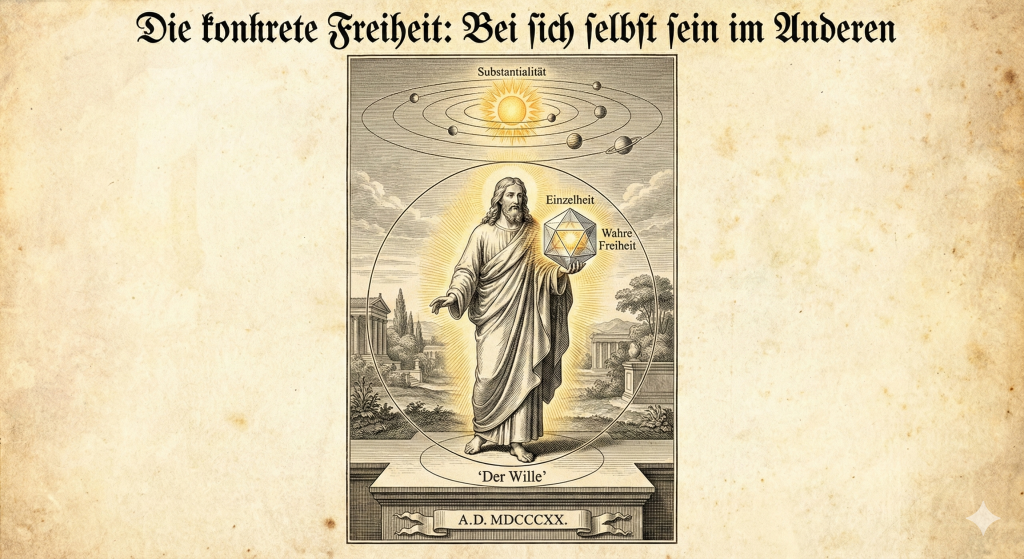γ) Der Wille ist die Einheit dieser beiden Momente; – die in sich reflektierte und dadurch zur Allgemeinheit zurückgeführte Besonderheit; – Einzelheit; die Selbstbestimmung des Ich, in einem sich als das Negative seiner selbst, nämlich als bestimmt, beschränkt zu setzen und bei sich, d. i. in seiner Identität mit sich und Allgemeinheit zu bleiben, und in der Bestimmung, sich nur mit sich selbst zusammenzuschließen. – Ich bestimmt sich, insofern es die Beziehung der Negativität auf sich selbst ist; als diese Beziehung auf sich ist es ebenso gleichgültig gegen diese Bestimmtheit, weiß sie als die seinige und ideelle, als eine bloße Möglichkeit, durch die es nicht gebunden ist, sondern in der es nur ist, weil es sich in derselben setzt. – Dies ist die Freiheit des Willens, welche seinen Begriff oder Substantialität, seine Schwere so ausmacht wie die Schwere die Substantialität des Körpers.
Jedes Selbstbewußtsein weiß sich als Allgemeines – als die Möglichkeit, von allem Bestimmten zu abstrahieren -, als Besonderes mit einem bestimmten Gegenstande, Inhalt, Zweck. Diese beiden Momente sind jedoch nur Abstraktionen; das Konkrete und Wahre (und alles Wahre ist konkret) ist die Allgemeinheit, welche zum Gegensatze das Besondere hat, das aber durch seine Reflexion in sich mit dem Allgemeinen ausgeglichen ist. – Diese Einheit ist die Einzelheit15), aber sie nicht in ihrer Unmittelbarkeit als Eins, wie die Einzelheit in der Vorstellung ist, sondern nach ihrem Begriffe (Enzykl. der philosoph. Wissenschaften, § 112-114), – oder diese Einzelheit ist eigentlich nichts anderes als der Begriff selbst. Jene beiden ersten Momente, daß der Wille von allem abstrahieren könne und daß er auch bestimmt sei – durch sich oder anderes -, werden leicht zugegeben und gefaßt, weil sie für sich unwahre und Verstandes-Momente sind; aber das dritte, das Wahre und Spekulative (und alles Wahre, insofern es begriffen wird, kann nur spekulativ gedacht werden) ist es, in welches einzugehen sich der Verstand weigert, der immer gerade den Begriff das Unbegreifliche nennt. Der Erweis und die nähere Erörterung dieses Innersten der Spekulation, der Unendlichkeit als sich auf sich beziehender Negativität, dieses letzten Quellpunktes aller Tätigkeit, Lebens und Bewußtseins, gehört der Logik als der rein spekulativen Philosophie an. – Es kann hier nur noch bemerklich gemacht werden, daß, wenn man so spricht: der Wille ist allgemein, der Wille bestimmt sich, man den Willen schon als vorausgesetztes Subjekt oder Substrat ausdrückt, aber er ist nicht ein Fertiges und Allgemeines vor seinem Bestimmen und vor dem Aufheben und der Idealität dieses Bestimmens, sondern er ist erst Wille als diese sich in sich vermittelnde Tätigkeit und Rückkehr in sich.
15) *[handschriftlich: ] besser Subjektivität

Schreibe einen Kommentar
Du musst angemeldet sein, um einen Kommentar abzugeben.